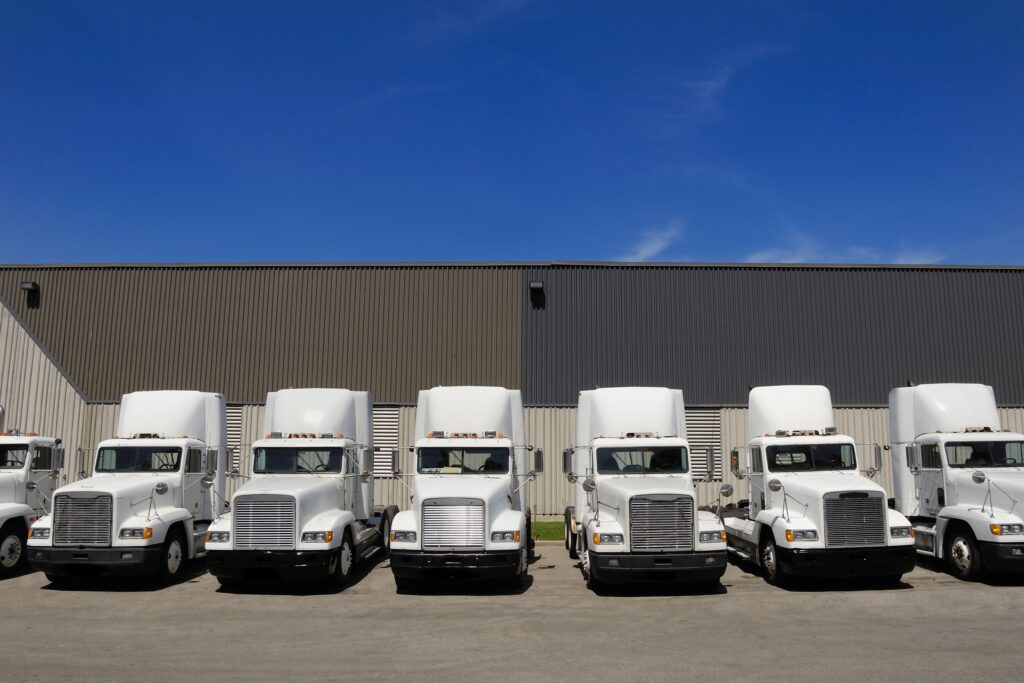The Trucking Industry and the Potential for Growth
The trucking industry is the backbone of the American economy, responsible for transporting goods across vast distances to ensure that products reach consumers in a timely manner. With its extensive network and efficient transportation infrastructure, this industry plays a pivotal role in connecting businesses across different sectors.
From delivering essential supplies to construction sites to transporting perishable goods to grocery stores, the demand for reliable trucking services continues to grow steadily. As consumer expectations evolve and e-commerce flourishes, there is no better time than now to dive into the world of trucking contracts.
Securing Trucking Contracts for Business Success

Securing trucking contracts is vital for the success and profitability of your business in this highly competitive industry. Establishing long-term partnerships with shippers and winning contract agreements can provide your company with a consistent stream of revenue, steady workflow, and increased operational stability.
By entering into contractual agreements with clients, you can establish trust, reliability, and dependability within the market. These contracts also offer an opportunity to negotiate favorable rates and terms that align with your business objectives.
Furthermore, securing contracts allows you to plan your resources effectively while reducing downtime between shipments. In short, obtaining trucking contracts is an essential step towards ensuring sustainable growth and prosperity for your company in today’s dynamic marketplace where reliability is key.
Understanding the Trucking Contract Landscape

Different Types of Trucking Contracts
When it comes to trucking contracts, there are several different types that you need to be familiar with. The first type is dedicated contracts.
These contracts involve working with a specific client on a long-term basis. You essentially become their go-to carrier, handling all their transportation needs.
Spot market contracts, on the other hand, are more short-term and immediate. With these contracts, you find available loads through load boards or brokers and bid on them to secure the job.
Another type of contract you might encounter is brokered contracts. In this case, a freight broker acts as an intermediary between carriers and shippers.
They connect carriers with available freight from various clients they work with. This can be a great way to get started in the industry since brokers often have established relationships with shippers.
Pros and Cons of Each Contract Type
Each type of trucking contract has its own advantages and disadvantages that you should consider before deciding which one suits your business best. With dedicated contracts, one major advantage is the stability they offer.
By having a long-term commitment from a client, you can better plan your operations and ensure consistent revenue streams for your trucking business. However, it’s important to note that dedicated contracts often require specific equipment or even driver training for specialized cargo.
Spot market contracts provide flexibility since they allow you to choose which loads to take based on availability and rates at any given time. This can be advantageous if you prefer variety in your work or need immediate cash flow for your business expenses.
On the downside, spot market rates can fluctuate wildly depending on supply and demand factors in the industry. Brokered contracts give smaller carriers access to a wider range of clients without having to invest heavily in marketing efforts or building direct relationships.
Brokers can help match you with appropriate loads and handle negotiations and paperwork, simplifying the process. However, keep in mind that brokers will take a commission from each load, which can impact your bottom line.
Market Trends and Demand Analysis
To succeed in securing trucking contracts, it’s crucial to stay informed about market trends and fluctuations in demand. Understanding industry trends will help you position your business strategically to capitalize on opportunities.
One significant trend in recent years is the increasing demand for specialized trucking services. With the growth of e-commerce and online retail, there has been a surge in the need for carriers capable of handling fragile or temperature-sensitive goods like pharmaceuticals or fresh produce.
Assessing market demands and adapting your operations accordingly will allow you to tap into profitable niches within the industry. Additionally, keeping an eye on economic indicators such as manufacturing output or consumer spending can provide insight into overall market health.
By closely monitoring these factors, you can anticipate changes in demand patterns and adjust your operations to align with emerging opportunities. Understanding the different types of trucking contracts available, weighing their pros and cons, and staying updated on market trends are essential steps towards successfully securing valuable trucking contracts.
Building a Strong Foundation

Registering your Trucking Company
Before diving into the world of trucking contracts, it is crucial to ensure that your trucking company is properly registered and licensed. This involves navigating the bureaucratic maze of government agencies and industry regulations.
Start by registering your business with the appropriate authorities, such as the Secretary of State or local business licensing department. Next, you’ll need to obtain various permits and licenses specific to the trucking industry.
These may include a Motor Carrier Authority (also known as an MC number), a USDOT number, and potentially state-specific permits like a hazardous materials endorsement if you plan to transport dangerous goods. Ensuring proper documentation not only demonstrates your compliance with legal requirements but also gives potential clients confidence in your professionalism.
Developing a Comprehensive Business Plan
A solid business plan is the bedrock upon which successful trucking companies are built. It serves as a roadmap for both short-term objectives and long-term vision.
When creating your business plan, be sure to highlight your unique value proposition – what sets you apart from competitors in the industry? Do you specialize in expedited deliveries, offer superior customer service, or have expertise in specialized freight like oversized loads?
Clearly defining what makes your company special will attract clients who align with those qualities. Additionally, outline financial projections and growth strategies that showcase how you intend to expand operations in order to secure lucrative trucking contracts.
Establishing a Strong Online Presence
In today’s digital age, establishing an online presence is essential for any business looking to succeed – including trucking companies vying for lucrative contracts! Invest in creating a professional website that showcases key information about your services, fleet, coverage areas, safety records, certifications/licenses held, and contact details. Ensure that the website is user-friendly and mobile-responsive, as many potential clients will be searching for trucking services from their smartphones or tablets.
Additionally, leverage social media platforms like LinkedIn, Facebook, and Twitter to engage with industry professionals, share relevant content, and promote your services. A strong online presence not only boosts your credibility but also helps potential clients find you easily when they’re in need of reliable trucking services.
Remember, building a strong foundation for your trucking company is crucial to attract and secure valuable trucking contracts. Registering your business correctly, developing a compelling business plan that highlights your unique value proposition, and establishing a strong online presence are all vital steps towards achieving success in the industry.
Networking and Relationship Building

Connecting with Potential Clients
One of the most effective ways to get trucking contracts is by attending industry events, conferences, and trade shows. These gatherings provide an excellent platform for networking with potential clients in the trucking industry. By participating in these events, you can showcase your expertise and services while connecting with decision-makers who are actively seeking reliable carriers for their transportation needs.
Look out for local or national trucking conferences and trade shows where shippers, brokers, and other industry professionals gather to learn about the latest trends and opportunities. Attending such events allows you to establish face-to-face connections that can be a game-changer when it comes to securing lucrative trucking contracts.
Tips for Effective Networking
To make the most out of industry events, it’s crucial to have a strategic approach towards networking. Start by doing some research beforehand on the event schedule and speakers.
Identify sessions or workshops that are aligned with your areas of expertise or interests so you can engage in meaningful conversations during breaks or Q&A sessions. It’s also beneficial to prepare a concise elevator pitch that highlights your unique value proposition as a carrier.
Approach potential clients confidently but respectfully, showing genuine interest in their business operations and transportation needs. Don’t forget to exchange contact information and follow up post-event – maintaining those connections is essential for future collaborations.
Identifying Key Decision-Makers
When attending industry events or targeting specific companies for trucking contracts, it’s crucial to identify key decision-makers within those organizations. These individuals hold the authority to make decisions regarding logistics partnerships and signing contracts. Conduct thorough research on target companies before approaching them so you know who the relevant contacts are – typically individuals holding job titles like Logistics Manager, Transportation Director, Supply Chain Manager, or Procurement Officer.
Utilize online platforms like LinkedIn to find and connect with these professionals, allowing you to establish a direct line of communication. Building relationships with decision-makers increases your chances of getting noticed and considered for potential trucking contracts, leading to long-term business partnerships in the industry.
Marketing Strategies for Attracting Contracts

Creating an Attractive Company Profile
When it comes to securing trucking contracts, having a compelling company profile is crucial. Your profile acts as the face of your business and provides potential clients with an overview of what sets you apart.
Start by highlighting the key features of your fleet – the number and types of trucks you have available for transportation. Emphasize how well-maintained and modern your vehicles are, as this instills confidence in potential clients that their goods will be transported safely.
Additionally, showcase your impeccable safety record, underscoring any industry certifications or safety accolades you may have received. Clearly outline the range of services you offer, such as long-haul or regional transportation, expedited delivery options, or specialized services like hazardous material handling and refrigerated transport.
Highlight Any Specialized Equipment
To stand out from competitors in the highly competitive trucking industry and attract lucrative contracts, it’s essential to highlight any specialized equipment or expertise that sets you apart. If your company specializes in refrigerated transport for perishable goods or pharmaceuticals, emphasize this unique capability in your marketing materials.
Emphasize how your state-of-the-art refrigeration systems ensure that temperature-sensitive items remain fresh throughout transit. By showcasing this specialization and expertise through targeted marketing efforts like website content and advertising campaigns, you position yourself as a go-to carrier for businesses needing reliable transportation solutions for fragile or perishable cargo.
Showcasing Testimonials
Nothing speaks louder than positive feedback from happy customers when it comes to attracting new trucking contracts. Collect testimonials from satisfied clients who have experienced seamless deliveries with your company – these can be powerful tools for winning over potential clients.
Include these testimonials on your website, social media platforms, and other promotional materials to build credibility and trust. Additionally, consider creating case studies that showcase successful projects you have completed.
Highlight the challenges faced and how your expertise and excellent service led to exceptional results. These case studies provide concrete examples of your company’s capabilities and track record in handling diverse transportation needs, further solidifying your reputation as a reliable and trustworthy carrier.
Remember, effectively marketing your trucking company is essential to attract the attention of potential clients seeking reliable transportation services. By creating an attractive company profile that showcases your fleet, safety record, service offerings, specialized equipment or expertise, as well as featuring testimonials from satisfied customers or case studies of successful projects, you can establish yourself as a top choice for businesses in need of trucking contracts.
Targeted Sales Approach

Identifying Potential Clients
When it comes to securing trucking contracts, one size definitely does not fit all. To maximize your chances of success, it’s crucial to identify potential clients whose shipping needs align with your services.
Start by researching industries that heavily rely on transportation, such as manufacturing, retail, or construction. Look for companies located in areas where you have a strong presence or can easily expand.
Consider factors like the volume of goods they transport and the frequency of shipments. By narrowing down your search to specific industries and locations, you can focus your efforts on targeting prospects who are more likely to require your services.
Crafting Personalized Proposals
Once you’ve identified potential clients, it’s time to create personalized proposals that address their unique pain points and challenges. Take the time to research each company thoroughly – understand their business model, shipping requirements, and any particular obstacles they face in their supply chain operations.
Tailor your proposal accordingly by highlighting how your trucking services can directly alleviate these pain points. For example, if a company struggles with timely deliveries due to a lack of tracking technology or inefficient route planning, emphasize how your advanced tracking systems and optimized routing strategies can ensure on-time deliveries and streamline operations.
Utilizing Data-Driven Insights
In today’s data-centric world, leveraging analytics can significantly enhance your chances of winning trucking contracts. Before approaching potential clients with proposals or pitching prices, gather relevant data to support the benefits of choosing your services over competitors’.
Use historical market trends and key performance indicators (KPIs) from previous projects as evidence of cost savings or efficiency improvements you have achieved for other clients. Highlight metrics such as reduced transportation costs, increased delivery speed, or enhanced inventory management.
Visualize the data in a clear and compelling way, whether through charts, graphs, or case studies. By providing concrete evidence of your track record and the potential impact on their bottom line, you can build trust and increase your chances of securing profitable trucking contracts.
Working with Freight Brokers

Understanding the Role of Freight Brokers
Freight brokers play a crucial role in the trucking industry by acting as intermediaries between carriers and shippers. They serve as matchmakers, connecting carriers with available capacity to shippers who require transportation services.
By leveraging their extensive networks and industry knowledge, freight brokers help streamline the process of finding suitable loads and securing contracts for carriers. They handle the logistics of negotiating rates, managing paperwork, and ensuring timely delivery, allowing carriers to focus on what they do best – transporting goods efficiently.
Building Relationships with Reputable Freight Brokers
Building strong relationships with reputable freight brokers is essential for carriers looking to secure consistent trucking contracts. Start by researching and identifying brokers who specialize in your niche or geographic area of operation. Reach out to them directly, introduce yourself, and highlight your unique value proposition as a carrier.
Nurture these relationships by maintaining open lines of communication, providing exceptional service on every load, and delivering on-time consistently. By building trust and demonstrating reliability over time, you increase your chances of being top-of-mind when brokers have contract opportunities that align with your capabilities.
Conclusion
In the world of trucking contracts, understanding the role of freight brokers is vital for carriers seeking steady business opportunities. By partnering with reputable freight brokers who possess deep industry knowledge and extensive networks, carriers can tap into a pool of potential clients they may not have access to otherwise. Building strong relationships based on trust and reliability ensures that you remain at the forefront when contract opportunities arise.
So embrace these connections, nurture them through excellent service provision, timely deliveries, and effective communication – success will surely follow. Keep driving forward!










